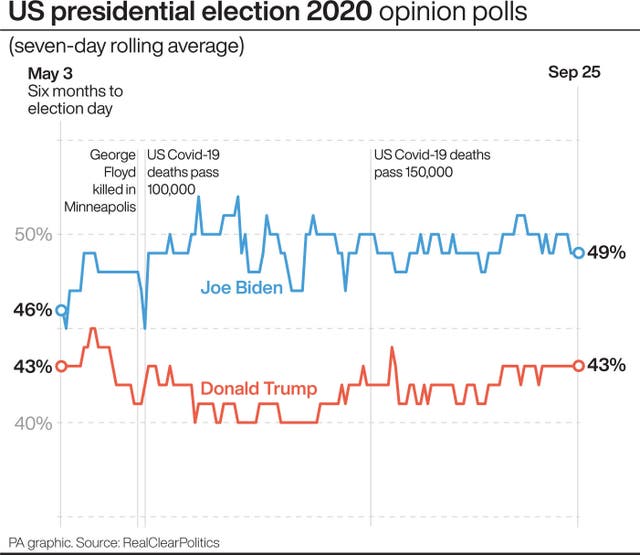
US president Donald Trump’s election campaign has grown increasingly focused on making inroads in Pennsylvania to offset potential vulnerabilities in other battleground states.
Mr Trump will travel to the state for the second time in a week on Saturday, hoping to attract the same rural and white working-class voters who delivered a narrow victory for him in 2016.
The in-person touch, in what may become the most important battleground in November’s poll, complements an aggressive get-out-the-vote operation that has been working for four years to find new voters by knocking on doors in competitive neighbourhoods.
Mr Trump narrowly flipped three Great Lakes states – Michigan, Pennsylvania and Wisconsin – from blue to red in 2016.
He has virtually no path to re-election without keeping at least one of those states out of Democratic challenger Joe Biden’s hands in November. The president’s campaign has long viewed Wisconsin as his best option, but Republican strategists have indicated their thinking has begun to shift.
There are growing concerns inside the campaign about Mr Trump’s ability to retain Wisconsin.
Even winning that upper mid-west battleground would not provide the required votes if Mr Biden claims Arizona.
But Pennsylvania, which has the joint fourth-most electoral college votes, would be enough.

“With Pennsylvania, I don’t have to make a play, we’ve got Pennsylvania,” Mr Trump boasted at a rally on Tuesday night just outside Pittsburgh.
However, that may be harder than the president suggests.
Despite fervent Republican efforts, no nominee for the party since George HW Bush in 1988 had captured the state until Mr Trump did four years ago, winning by just 44,000 votes out of nearly 5.9 million ballots cast.
And as someone born in Scranton, Mr Biden is also heavily focused on the state.
Recent Pennsylvania polls disagree over the state of the race. Some show Mr Trump and Mr Biden neck-and-neck, while others have the challenger slightly ahead of the president.
And just as Florida became associated with delays and controversies after the state put George W Bush in the White House in 2000, Pennsylvania may have its own drama looming which could provide the tipping point for the 2020 poll.
— Donald J. Trump (@realDonaldTrump) September 26, 2020
With three million or more voters expected to cast ballots by mail, members of congress, party officials and election staff are warning that the conditions are ripe for a presidential election result to be left hanging in limbo on a drawn-out vote.
A partisan stalemate and lawsuits have held up efforts to fix glitches in the state’s fledgling mail-in voting law, and Democrats are warning that as many as 100,000 or more mail-in ballots – dubbed “naked ballots” – could be invalidated if they are not put in the proper envelope by people unaccustomed to voting by mail.
Pennsylvania is anchored by large cities – Philadelphia to the east, and Pittsburgh to the west – on opposite ends, each with sprawling suburbs. But the rest of the state is largely rural, comprised of small cities and towns where Mr Trump scored heavily four years ago.
He will likely need to do this again, as his re-election prospects have slipped since 2016 in vote-rich suburban Philadelphia, where he underperformed by past Republican measures, raising the stakes on his campaign’s more aggressive outreach to new rural and small-town voters across the industrial north.
Thanks for a great trip, Minnesota! Don’t forget that early voting is now open across the state. Head to https://t.co/7PghlU2FSm to make your plan to vote today. pic.twitter.com/xRLkPOGwcr
— Joe Biden (@JoeBiden) September 26, 2020
Despite the pandemic, Mr Trump’s campaign has prioritised in-person events.
The president and his allies are also hitting hard in TV ads, accusing Mr Biden of wanting to ban fracking, a sensitive topic in America’s number two natural gas state, behind Texas.
While Mr Biden insists he does not want to ban fracking broadly – he wants to ban it on federal lands and make electricity production fossil-fuel free by 2035 – it may make it harder for him to win back rank-and-file union members who work on an expanding network of pipelines, power plants and processing facilities.
Mr Biden may have an advantage in getting his message out in the state. He has outspent the president by more than two-to-one in Pennsylvania from last spring through this month, according to data from Kantar/CMAG.
From April through to mid-September, Mr Biden had spent 27 million dollars (£21 million) compared with the Trump campaign’s 12.5 million dollars (£9.8 million).


Comments: Our rules
We want our comments to be a lively and valuable part of our community - a place where readers can debate and engage with the most important local issues. The ability to comment on our stories is a privilege, not a right, however, and that privilege may be withdrawn if it is abused or misused.
Please report any comments that break our rules.
Read the rules here